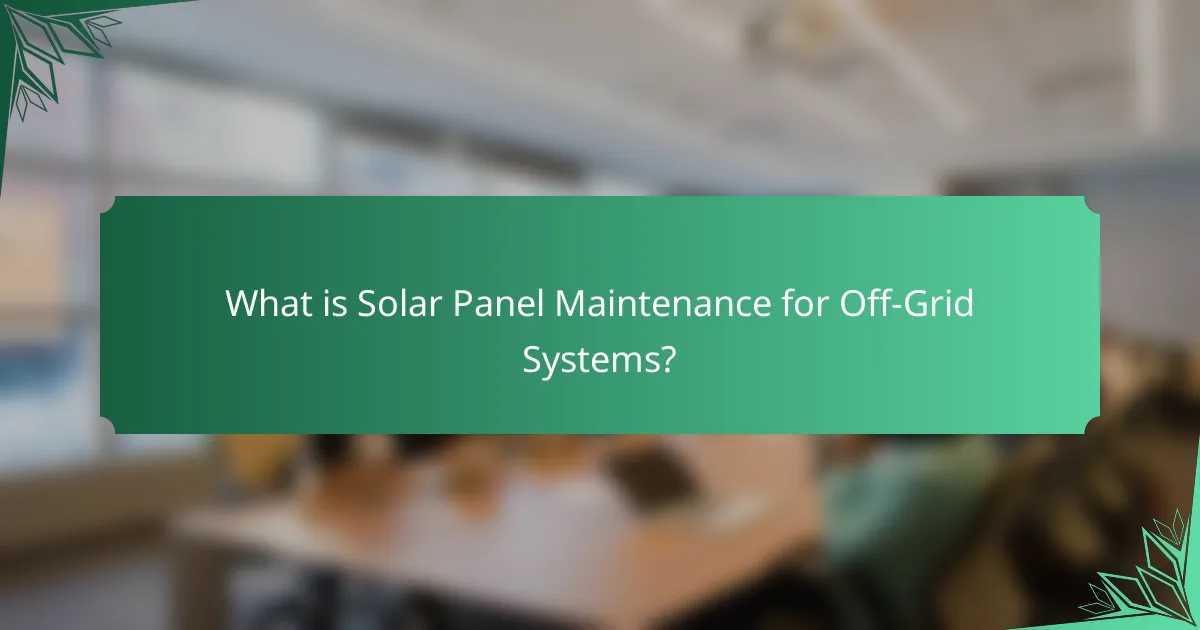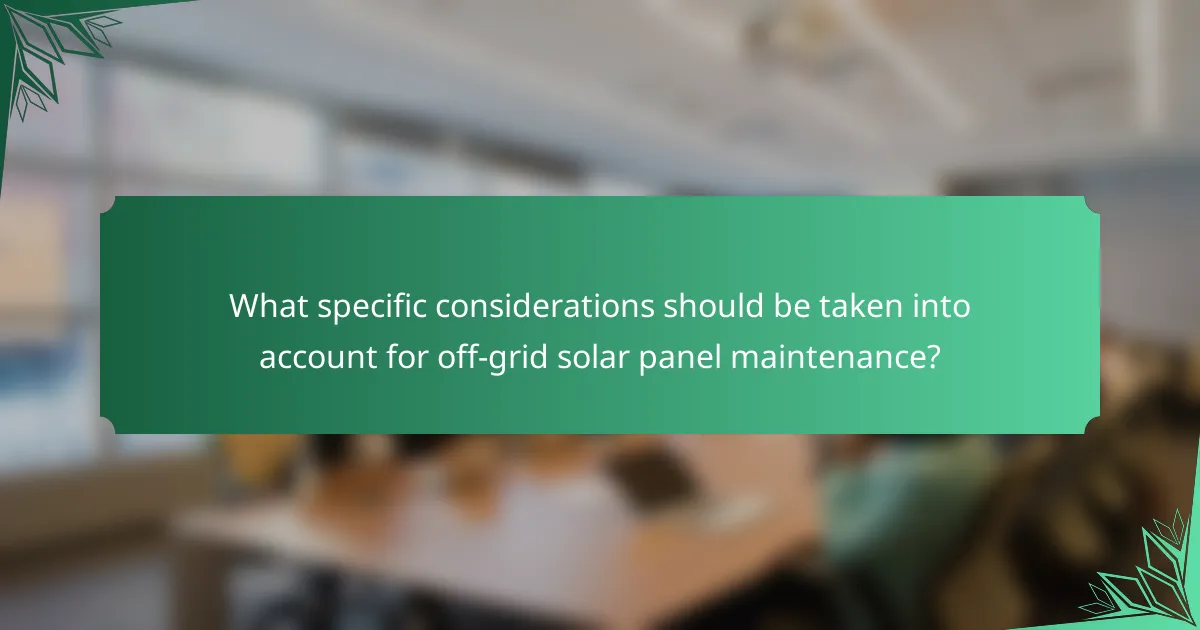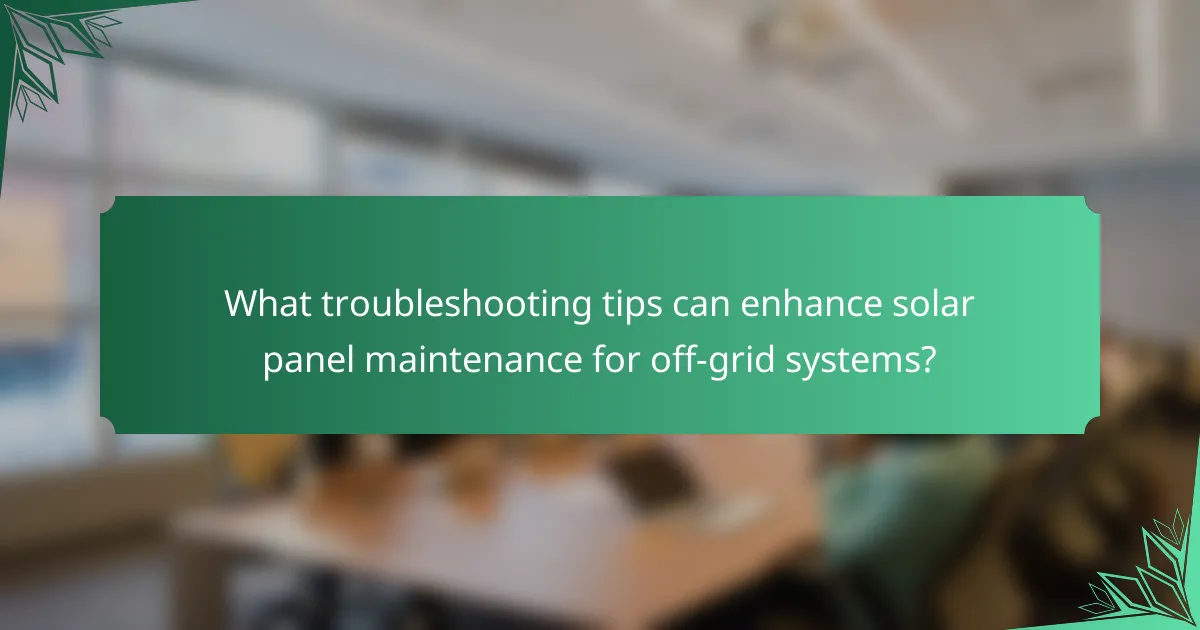
What is Solar Panel Maintenance for Off-Grid Systems?
Solar panel maintenance for off-grid systems involves regular cleaning, inspection, and performance monitoring. Cleaning removes dirt and debris that can hinder efficiency. Inspections check for physical damage, loose connections, or corrosion. Performance monitoring ensures the system operates at optimal levels. Regular maintenance can extend the lifespan of solar panels. It is recommended to perform these tasks at least twice a year. Proper maintenance can lead to a 20-30% increase in energy production.
How does solar panel maintenance differ for off-grid systems compared to grid-tied systems?
Solar panel maintenance for off-grid systems differs significantly from grid-tied systems. Off-grid systems require more frequent battery maintenance. This includes checking fluid levels and ensuring proper charging cycles. In contrast, grid-tied systems primarily focus on panel cleaning and inverter checks. Off-grid systems also need regular monitoring of energy consumption to optimize battery life. Grid-tied systems benefit from utility support during maintenance, while off-grid systems rely entirely on self-sufficiency. Moreover, off-grid systems may require additional attention to environmental factors, such as dust and debris accumulation. These differences highlight the unique challenges of maintaining off-grid solar systems compared to their grid-tied counterparts.
What are the unique challenges faced in off-grid solar panel maintenance?
Off-grid solar panel maintenance faces unique challenges due to remote locations. Accessibility is often limited, making it difficult to reach panels for repairs or cleaning. Weather conditions can be harsh, impacting the durability and performance of the panels. Additionally, without a grid connection, energy storage systems may require more frequent monitoring and maintenance. The lack of immediate professional support can delay repairs, leading to prolonged downtime. Limited resources and tools in remote areas complicate maintenance efforts. Regular inspections are essential, yet challenging to conduct consistently. Finally, varying sunlight exposure can affect energy generation, necessitating tailored maintenance strategies.
How do environmental factors impact off-grid solar panel maintenance?
Environmental factors significantly impact off-grid solar panel maintenance. Dust accumulation can reduce solar panel efficiency by blocking sunlight. Areas with high humidity may lead to corrosion and mold growth on panels. Snow and ice can obstruct sunlight and add weight, risking structural damage. Extreme temperatures can affect battery performance and lifespan. Additionally, heavy rainfall can wash away debris but may also cause flooding issues. Regular maintenance is essential to mitigate these environmental effects. Monitoring local weather patterns can help in planning maintenance schedules.
What are the essential maintenance tasks for off-grid solar panels?
The essential maintenance tasks for off-grid solar panels include regular cleaning, inspection of components, and monitoring system performance. Cleaning solar panels removes dust and debris that can reduce efficiency. Inspections should focus on checking for physical damage, loose connections, and corrosion. Monitoring performance involves checking energy output to ensure the system operates efficiently. Additionally, battery maintenance is crucial for systems storing energy. This includes checking fluid levels in lead-acid batteries and ensuring proper charging cycles. Regular maintenance helps prolong the lifespan of the solar system and maintains optimal energy production.
How often should off-grid solar panels be cleaned and inspected?
Off-grid solar panels should be cleaned and inspected at least twice a year. Cleaning frequency may increase in dusty or pollen-heavy environments. Inspections should focus on checking for damage, loose connections, and dirt accumulation. Regular maintenance ensures optimal performance and longevity. Research indicates that clean panels can improve energy output by up to 30%. Therefore, adhering to this schedule maximizes efficiency and system reliability.
What tools and materials are needed for effective solar panel maintenance?
Effective solar panel maintenance requires specific tools and materials. Essential tools include a soft-bristle brush for cleaning, a hose with a spray nozzle for rinsing, and a multimeter for checking voltage. A squeegee can help remove excess water after cleaning. Safety gear, such as gloves and goggles, is important for protection. Additionally, a voltage tester ensures the system is safe before maintenance. Regularly using these tools helps maintain efficiency and prolongs the lifespan of solar panels.
Why is regular maintenance crucial for off-grid solar systems?
Regular maintenance is crucial for off-grid solar systems to ensure optimal performance and longevity. These systems rely on solar panels, batteries, and inverters to function effectively. Without regular checks, dirt and debris can accumulate on solar panels, reducing their efficiency by up to 25%. Batteries require maintenance to prevent sulfation and ensure they hold a charge properly. Inverters can also fail if not inspected regularly, leading to system downtime. Studies show that systems with regular maintenance can last 20-30% longer than those without. Therefore, consistent upkeep is essential for maximizing energy production and reducing long-term costs.
What are the potential consequences of neglecting solar panel maintenance?
Neglecting solar panel maintenance can lead to decreased efficiency and increased costs. Dust, dirt, and debris accumulation can block sunlight, reducing energy output by up to 25%. Faulty connections or damaged panels can result in system failures, leading to costly repairs. Over time, lack of maintenance can shorten the lifespan of solar panels, which typically last 25 years. Regular inspections can identify issues early, preventing more significant problems. Failure to maintain solar panels can also void warranties, leaving the owner responsible for repairs. Overall, neglecting maintenance negatively impacts energy production and financial returns.
How can regular maintenance improve the lifespan of solar panels?
Regular maintenance can significantly improve the lifespan of solar panels. Routine cleaning removes dirt and debris that can block sunlight. This ensures optimal energy absorption. Regular inspections identify and address issues like loose connections or damaged components. Addressing these problems early prevents more significant damage. Additionally, monitoring performance helps detect efficiency drops. Keeping solar panels in good condition can extend their operational life beyond 25 years. According to the National Renewable Energy Laboratory, well-maintained solar panels can retain up to 90% of their efficiency over 20 years.

What specific considerations should be taken into account for off-grid solar panel maintenance?
Off-grid solar panel maintenance requires regular cleaning and inspection. Dirt, dust, and debris can significantly reduce efficiency. Inspect connections and wiring for wear or corrosion. Ensure that the inverter functions properly for optimal energy conversion. Monitor battery health and charge cycles to extend lifespan. Seasonal adjustments may be necessary to maximize sunlight exposure. Check for shading from nearby trees or structures that can affect performance. Regularly review system performance data to identify potential issues early.
How does the location of the off-grid system affect maintenance needs?
The location of the off-grid system significantly affects maintenance needs. Systems in remote areas may require more frequent checks due to limited access. Harsh weather conditions, such as heavy snow or intense heat, can increase wear on components. Proximity to trees or vegetation may lead to more frequent cleaning to prevent shading and debris accumulation. Additionally, systems in areas with high dust or particulate matter may require regular cleaning to maintain efficiency. Local wildlife can also pose risks, necessitating protective measures or repairs. Overall, the geographical context determines the frequency and type of maintenance required for optimal performance.
What are the implications of remote locations on maintenance accessibility?
Remote locations significantly hinder maintenance accessibility for solar panel systems. Limited transportation options delay response times for repairs. Harsh weather conditions can further complicate access and safety. Additionally, the scarcity of local resources increases operational costs. Remote sites often lack skilled technicians, necessitating travel from distant areas. This can lead to longer downtimes and reduced system efficiency. According to a study by the National Renewable Energy Laboratory, maintenance costs can increase by up to 30% in remote areas compared to urban settings. These factors collectively impact the overall reliability and performance of off-grid solar systems.
How do seasonal changes influence maintenance schedules for off-grid systems?
Seasonal changes significantly influence maintenance schedules for off-grid systems. In winter, snow accumulation can obstruct solar panels, necessitating more frequent cleaning. Cold temperatures may also affect battery performance, requiring regular checks and potential replacements. Spring often brings increased rainfall, which can lead to system corrosion, prompting inspections of electrical connections. Summer heat can stress components, making it essential to monitor system temperatures and cooling methods. Autumn leaves can block sunlight, so clearing debris becomes crucial before winter. Overall, adapting maintenance schedules to seasonal conditions ensures optimal performance and longevity of off-grid systems.
What unique maintenance practices are recommended for off-grid solar systems?
Regular cleaning of solar panels is essential for off-grid solar systems. Dust, dirt, and debris can reduce efficiency. Inspecting wiring and connections is crucial to prevent failures. Regularly check battery health to ensure optimal performance. Monitor system performance metrics for any irregularities. Ensure proper ventilation around batteries to prevent overheating. Schedule professional inspections annually for comprehensive maintenance. These practices help maintain energy production and system longevity.
How can users optimize energy production through maintenance activities?
Users can optimize energy production through regular maintenance activities. Cleaning solar panels removes dirt and debris that block sunlight. This can increase energy output by up to 20%. Inspecting connections ensures efficient energy transfer. Regular checks for shading from nearby trees or structures can prevent reduced performance. Monitoring system performance helps identify issues promptly. Replacing damaged components maintains optimal functionality. Following manufacturer guidelines for maintenance schedules is essential. These practices collectively enhance the efficiency and longevity of solar energy systems.
What preventative measures can be taken to reduce maintenance frequency?
Regular cleaning of solar panels can significantly reduce maintenance frequency. Dust, dirt, and debris can accumulate and hinder efficiency. A biannual cleaning schedule is often sufficient in most regions. Additionally, installing protective barriers can prevent debris buildup. Monitoring system performance regularly helps identify issues early. Using high-quality components can enhance durability and reduce failures. Finally, ensuring proper installation minimizes the risk of maintenance needs. These measures collectively contribute to less frequent maintenance for off-grid solar systems.

What troubleshooting tips can enhance solar panel maintenance for off-grid systems?
Regularly inspect solar panels for dirt and debris. Clean panels with water and a soft cloth to enhance efficiency. Check connections for corrosion or loose wiring. Tighten any loose connections to ensure proper function. Monitor battery levels consistently for optimal performance. Replace batteries that show signs of wear or decreased capacity. Ensure the inverter is functioning correctly by checking error codes. Consult the inverter manual for troubleshooting specific issues. Regularly assess shading from nearby trees or structures. Trim any overhanging branches to maximize sunlight exposure.
What common issues arise in off-grid solar panel systems?
Common issues in off-grid solar panel systems include inadequate energy storage, inefficient energy production, and system component failures. Inadequate energy storage occurs when batteries do not hold enough charge for usage, leading to power shortages. Inefficient energy production can result from shading, dirt, or misalignment of solar panels, reducing overall output. System component failures may include inverter malfunctions or wiring issues, which can disrupt power supply. Regular maintenance and monitoring can help mitigate these issues, ensuring optimal performance of the solar system.
How can users identify and resolve performance issues in their solar panels?
Users can identify and resolve performance issues in their solar panels by regularly monitoring energy output and conducting visual inspections. Checking the inverter’s display can reveal system performance metrics. Users should compare current energy production to historical data to spot discrepancies. Dust, debris, or shading on panels can hinder performance, so cleaning and removing obstructions is crucial. Additionally, inspecting wiring for damage or corrosion can prevent further issues. If problems persist, consulting a professional for troubleshooting may be necessary. Regular maintenance can enhance efficiency and longevity.
What steps should be taken if solar panels are not producing expected energy output?
Check the solar panel connections and wiring for any loose or damaged components. Inspect the panels for dirt, debris, or shading that may block sunlight. Clean the panels with water and a soft cloth to remove any obstructions. Verify that the inverter is functioning properly and displaying normal readings. Monitor the energy output using a solar monitoring system to identify performance issues. Assess the orientation and tilt of the panels to ensure they are optimally positioned for sunlight exposure. If problems persist, consult a professional technician for a thorough evaluation and repair. Regular maintenance can prevent future energy output issues.
What best practices should be followed for maintaining off-grid solar panels?
Regular cleaning of off-grid solar panels is essential for optimal performance. Dust, dirt, and debris can significantly reduce their efficiency. Use a soft cloth or sponge with mild soap and water for cleaning. Avoid abrasive materials that can scratch the surface.
Inspect panels periodically for any signs of damage or wear. Look for cracks, loose connections, or corrosion. Promptly address any issues to prevent further damage.
Check the inverter and battery system regularly. Ensure that connections are secure and functioning properly. Monitor battery levels to maintain optimal performance.
Keep vegetation trimmed around the panels. Overgrown plants can create shade and reduce sunlight exposure.
Lastly, ensure that the installation angle is optimal for solar exposure. Adjustments may be necessary based on seasonal changes. These practices help maintain the efficiency and longevity of off-grid solar panels.
How can users create a sustainable maintenance routine for their solar systems?
Users can create a sustainable maintenance routine for their solar systems by following a structured approach. Regularly cleaning the solar panels is essential to remove dirt and debris. This can enhance energy efficiency by up to 25%. Users should inspect the system for any physical damage at least twice a year. Checking connections and wiring can prevent energy losses. Monitoring energy output regularly helps identify performance issues early. Users can also schedule professional inspections annually for comprehensive assessments. Maintaining the battery system is crucial for longevity and performance. Keeping the battery terminals clean and checking electrolyte levels can extend battery life significantly.
What resources are available for learning more about off-grid solar panel maintenance?
Online courses and tutorials are available for learning about off-grid solar panel maintenance. Websites like Coursera and Udemy offer specific courses on solar energy systems. YouTube also has numerous video tutorials that demonstrate maintenance practices. Manuals from solar panel manufacturers provide essential guidelines for upkeep. Forums and communities, such as those on Reddit, share personal experiences and tips. Books on renewable energy often contain sections dedicated to maintenance. Local workshops or community colleges may offer hands-on training sessions. Industry publications and websites frequently publish articles on best practices for solar panel care.
Solar panel maintenance for off-grid systems is crucial for ensuring optimal performance and longevity. This article covers essential maintenance tasks such as regular cleaning, inspections, and performance monitoring, highlighting the differences between off-grid and grid-tied systems. It addresses unique challenges faced in remote locations, the impact of environmental factors, and the importance of a structured maintenance routine. Additionally, it provides troubleshooting tips, best practices, and resources for users to enhance their understanding and management of off-grid solar systems. Regular maintenance can significantly improve energy production and extend the lifespan of solar panels.